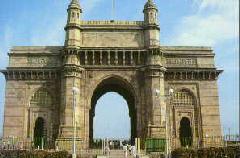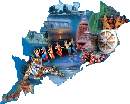r u from india ?
By tvnaresh
@tvnaresh (1581)
India
100 responses
@bapi_da (760)
• India
18 Oct 06
I am from INDIAN.INDIA is a great country.India (Hindi: ???? Bharat), officially the Republic of India, is a country in South Asia. It is the seventh-largest country by geographical area, the second most populous country, and the largest democracy in the world. India has a coastline of over seven thousand kilometres[1] and borders Afghanistan [2] and Pakistan to the west; China, Nepal, and Bhutan to the north-east; and Bangladesh and Myanmar to the east. India is adjacent to the Indian Ocean island nations of Sri Lanka, Maldives, Indonesia and Thailand.
The people of India have had a continuous civilization since 3300 B.C., when the inhabitants of the Indus River valley developed an urban culture based on commerce and sustained by agricultural trade.[3] The subcontinent became a centre of important trade routes, cultural development and vast empires. Hinduism, Sikhism, Buddhism and Jainism all have their origins in India, while Islam and Christianity enjoy a strong cultural heritage. India emerged as modern democratic nation-state in 1947 after a long and hard struggle for independence. India's population, wildlife, geographical terrain and climate system are among the most diverse in the world. Modern India is now self-sufficient in agricultural production, the tenth most industrialised country in the world, one of the legitimate nuclear-deterrent capable countries, the sixth nation to have gone into outer space, and is now considered an emerging superpower. India is, however, still an economically developing country and ranks 122nd in per capita income among the nations of the world and 127th in the United Nations 2005 human development index. However, with its high rates of growth, its standard of living is expected to rise greatly in the twenty first century.
1 person likes this
@newindipost (168)
• India
22 Oct 06
I am from India.Let me share some information about Indai.
India is referred to as the largest democracy in the world, by virtue of the fact that it has the largest electing population among democratic countries. The country has a federal form of government and a bicameral parliament operating under a Westminster-style parliamentary system. It has three branches of governance: the Legislature, Executive and Judiciary. The President is the head of state, though he has a largely ceremonial role to play. He is also the Supreme Commander of India's armed forces. The President is elected indirectly by an electoral college for five-year terms. Presidential assent is needed for a Bill or Ordinance passed by the Parliament to come into force. The Prime Minister is the de facto head of government, and has most executive powers. He or she is appointed by the President, with the requirement that he or she enjoy the support of the party or coalition having more than 50% seats in the lower house. The Union Council of Ministers headed by the Prime Minister aids and advises the President on governance matters.
The legislature of India is the bicameral Parliament, which consists of the upper house called the Rajya Sabha (Council of States), and the lower house called the Lok Sabha (House of People). The 245-member Rajya Sabha is chosen indirectly through the state Legislative Assemblies, and has a staggered six-year term. Each state sends members to the Rajya Sabha in a proportion of its population. The 545-member Lok Sabha is directly elected (Some seats are reserved for Caste based system) by popular vote for a five-year term (except two nominated Anglo-Indian members), and is the determinative constituent of political power and government formation. Universal adulthood suffrage is guaranteed by the Constitution for citizens above 18 years of age. The executive arm consists of the President, Vice-President, and the Council of Ministers (the Cabinet being its executive committee) headed by the Prime Minister. Any minister holding a portfolio must be a member of either house of parliament. In the Indian parliamentary system, the executive is subordinate to the legislature.
India's independent judiciary consists of the Supreme Court, headed by the Chief Justice of India. The Supreme Court has both original jurisdiction over disputes between states and the Centre, and appellate jurisdiction over the eighteen High Courts of India, and additionally, the power to declare Union and state laws null and void if in conflict with the Constitution.
























